Ready to learn more?
Get all the details straight to your inbox!
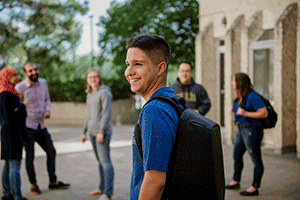
To enrol as a Luther College student, simply fill out the University of Regina application form and select Luther as your campus of choice.

Wondering where to live? Our student residence, The Student Village at Luther College, is considered a great choice for first-year student accommodation. Individual private rooms mean you can stick to your own schedule and you never have to deal with roommate hassles.
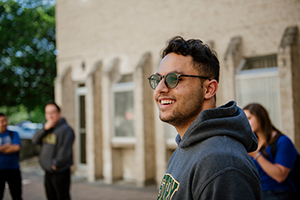
Every degree program at Luther College offers a study abroad option and an optional experiential learning component where you gain real world experience and get paid while going to school!
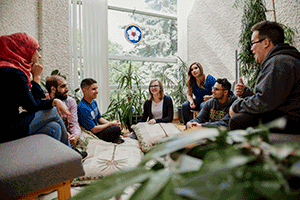
Luther College appeals to students who want to study in a safe, nurturing, and inclusive environment. We welcome students of all faiths, ethnicities, backgrounds, religions, genders, and sexual orientations.
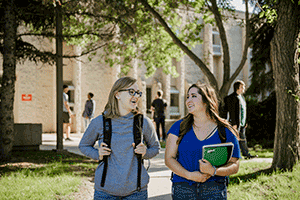
Luther College is a great choice for high school to university transition. Enjoy all the benefits of a larger campus, without feeling lost in the crowd. Our community is full of caring mentors and peers to ensure a positive student experience.
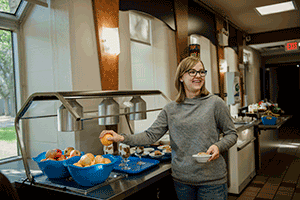
Living in The Student Village at Luther College, our student residence, comes with a choice of healthy, nutritious meal plans. That means no grocery shopping, no meals to cook, and no dirty dishes to worry about. You can focus on your studies and wellness!
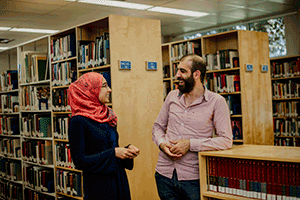
The Luther Library has over 24,000 items in its collection, 5,000 books checked out per year, and 7,000 students who come through its door per month.

Luther College students are eligible for nearly $100,000 in academic awards – in addition to scholarships and bursaries awarded by the U of R.
Get all the details straight to your inbox!
By Mary Vetter (Biology)
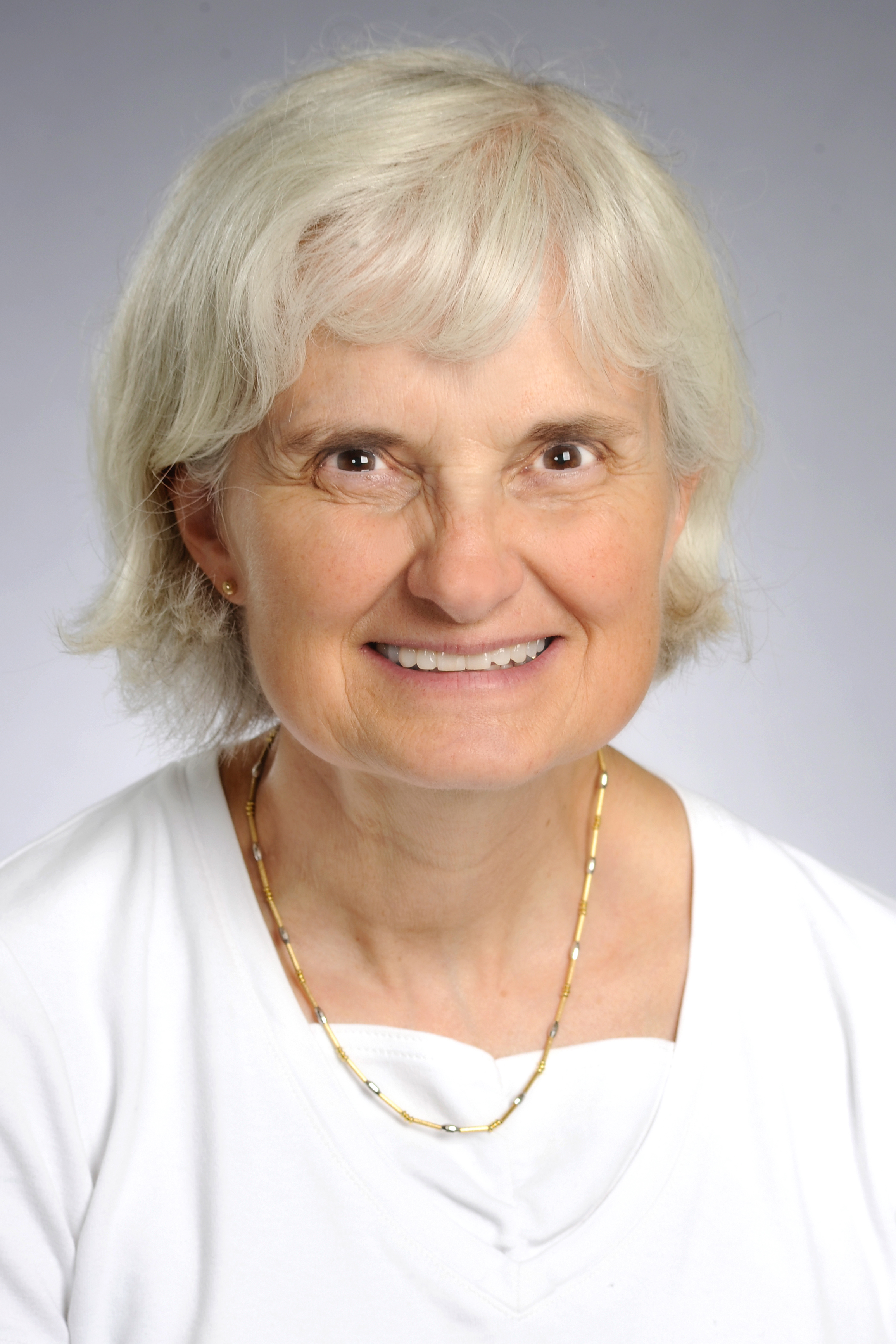 As I look back over my teaching career at Luther College, the highlights are the times I had the privilege of team teaching with others. Team teaching challenged me to grow and exposed my insecurities. But above all I learned so very much and benefitted so deeply from the knowledge, wisdom, excellence, humour, flexibility, and integrity of those with whom I worked.
As I look back over my teaching career at Luther College, the highlights are the times I had the privilege of team teaching with others. Team teaching challenged me to grow and exposed my insecurities. But above all I learned so very much and benefitted so deeply from the knowledge, wisdom, excellence, humour, flexibility, and integrity of those with whom I worked.
In his “Issues in Science and Religion” class Dr. Bill Stahl [Editor’s note: he founded Impetus in 2010 and retired from Luther College in 2013] showed me how to stimulate and manage class discussion and other active learning exercises in the classroom. It was no small feat for a biologist – much more comfortable with a simple lecture approach to classes – to “go out on a limb” and implement these kinds of activities in my own courses. From both Bill and Dr. Bryan Hillis, I learned a lot of vocabulary and concepts (they would never know before now how, in a pre-Wikipedia world, I spent hours during the semester researching things like “epistemology”, “metaphysics”, and countless other concepts that I must have been exposed to as an undergraduate – at least I assume so!). From Bryan I also learned how meticulous preparation builds confidence, and how to pose and mark essay questions. I have tried to implement this wisdom in all of my courses since then.
In her class “Interdisciplinary Studies: Contemporary Issues”, I learned from Dr. Mary Hampton about group work, and how beneficial it could be for students. It was in her class sessions that I first saw teaching circles, and experienced the powerful validation of students’ life experiences, reflections, and insights that come out of this wonderful approach. I suspect Mary doesn’t even know how I’ve cherished and implemented this particular little gem over the years: she explained how she encouraged broad participation in classroom discussions by handing out hard candies to students who had already spoken, as she found that a slowly-dissolving candy in the mouth gives others a chance to respond! From Dr. Angela Terpstra I first learned about Community Service Learning (CSL); she was years ahead of her time, and her Interdisciplinary Studies course (IDS) was the first course on campus to require students to do CSL and to bring their reflections back into the classroom. From Dr. Volker Greifenhagen and Dr. Brenda Anderson, I’ve learned how deeply committed Christians love and value other religions, and their unabashed witness of their love has opened my mind and enriched my life immeasurably. From Volker I’ve also learned that opening a class with music sets up an ambience and an openness to exploration – in addition to forging a bond with students at least a generation younger – although I know that the amazing breadth and depth of musical knowledge and appreciation is pretty unique, and I couldn’t possibly adequately emulate this. If it wasn’t for Brenda, I would not have experienced the Blanket Exercise, nor seen how ALL of us in the classroom can be respectfully challenged to confront our biases and “-isms”. These classroom lessons come back to me so very, very often in my day-to-day activities. From Dr. Roger Petry I have learned to think deeply about my lifestyle, but also about bringing in very practical, hands-on activities directly into the classroom. I’ll never forget the first time I did my own sustainability map, right along with the students. You’ll never know, Roger, how that experience has informed my whole thinking about what my retirement could (and hopefully will!) be like. Dr. Noel Chevalier has a relaxed and open teaching style that puts everyone at ease and encourages students to jump in to the discussion. I’ve tried to emulate that approach, and I am getting better – but I’ll never be THAT good! Dr. Viktoriya Galushko showed us how hands-on simulations can foster understanding of complex economic topics. I credit Viktoriya with my students doing mitosis and meiosis with pipe cleaners and beads right in the classroom.
And, of course, at Luther College we have been so fortunate to have our Writing Across the Disciplines programme. Professor Camilla McCabe was in inspiration to bring writing of all kinds into the classroom. Professor Scott Wilson, thank you for teaching me at least as much about writing (and marking) short-answer questions as you taught my students. Once again I find myself wishing I’d known about this years ago!
This is my last year of teaching, and as she will be taking over one of my upper-level biology courses, Dr. Britt Hall participated in teaching “Ecosystems Since Glaciation” this semester. Britt taught the students (and me!) a whole new way of presenting lab reports as infographics. I so regret not having known about this many years ago, as students’ learning is so much deeper as they explore challenging concepts more deeply and present their results in creative and insightful ways. Thank you, Britt, for everything I’ve learned from you about so many important concepts!
Although I had a wonderful liberal arts education, I quickly learned in these team teaching experiences that I still had (and have) so much to learn – and that I’m never too old to keep on learning! So consider this fair warning, my precious and esteemed colleagues: I’ll be smiling at you from the back of some of your classrooms once I retire – too late to employ what I learn about teaching from you in my own classes, but just in time to love and appreciate you even more.